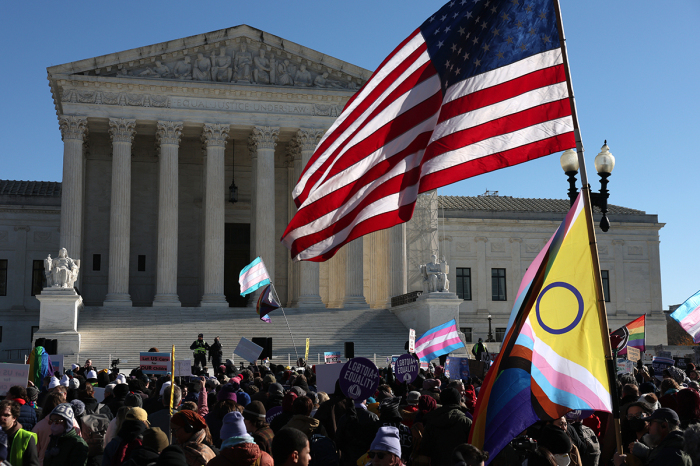Supreme Court ruling may create ‘unavoidable conflict’ between religious liberty, LGBT ideology, group warns
Court likely to uphold Tenn. ban on 'gender-affirming care,' but questions remain

A faith-based nonprofit group is warning Christians to keep an eye on a high-profile case before the United States Supreme Court that could have long-term implications for religious liberty.
Last week, the nation’s highest court heard oral arguments on Tennessee’s ban on sex-change procedures for minors, including the prescribing of puberty blockers, cross-sex hormones and body-mutilating surgeries, such as castration. Opponents argue that such bans deprive minors of necessary medical care, while supporters insist that the laws protect children from making irreversible and harmful decisions.
The case involves whether Tennessee’s law violates the Equal Protection Clause of the 14th Amendment, requiring that people in similar circumstances be treated the same under the law. Both sides in the case have argued they are acting to protect minors from harm.
While a ruling in the case won’t be released until next year, The Associated Press reports the conservative-majority court appeared poised to uphold Tennessee’s law even as many justices raised concerns about the involvement of the judiciary in regulating medical procedures. Trey Dellinger, senior legal fellow at the American Family Association, warned that the outcome of the decision could have long-lasting implications for religious liberty.
Dellinger suggested that a ruling against the Tennessee law could set a precedent that clashes with Christian values. “There is an unavoidable conflict between the Christian faith and the radical trans agenda,” Dellinger explained. “Trans identity politics is just the latest manifestation of the age-old tendency to make an idol of one’s own desires, to set oneself up as one’s own god.”
“The inevitability of that conflict means that Christians should be tuned in to what the Court does here,” he added.
He suggested that constitutionalizing transgenderism could have severe consequences for religious freedoms, particularly in situations like custody disputes where a Christian parent might face challenges when their child’s gender identity conflicts with their faith.
Dellinger warned about seeing cases similar to that of Texas father Jeff Younger, who has found himself in a bitter custody battle with his ex-wife as a result of her efforts to get one of their twin sons to identify as a girl.
“Imagine a Christian husband and wife have a child, the husband is unfaithful, and they divorce. Then the husband ‘transitions’ to a female identity and seeks custody of the child,” he said. “The wife, knowing her child would be raised in an environment hostile to her Christian faith, opposes granting custody to the transitioning husband. Would giving gender transition constitutionally protected status require a family court judge to ignore the transition in the custody dispute?”
“That is just one of many troubling questions for Christians that could arise from constitutionalizing trans rights in this case,” he contended.
Dellinger also took issue with the analysis made by the three progressive justices during oral arguments. At one point, Justice Sonia Sotomayor equated body-mutilating trans surgeries with the risk of taking over-the-counter medication.
“Every medical treatment has a risk, even taking aspirin,” she was quoted as saying Wednesday.
Dellinger condemned Sotomayor’s remarks, calling it “a strained comparison” that undermines the court’s responsibility to neutrally apply the U.S. Constitution.
“The risks of taking aspirin are not comparable to taking hormones that permanently cause infertility and destroy a child’s normal, healthy, physical and mental development,” Dellinger told CP.
He also criticized Associate Justice Ketanji Brown Jackson for her remarks in which she compared the Tennessee law to Virginia’s ban on interracial marriage that was struck down by the Supreme Court in the 1967 case Loving v. Virginia.
“In Loving, those same kinds of scientific arguments were made,” Brown said, explaining that in that case, Virginia had maintained that when “the scientific evidence is substantially in doubt,” the Supreme Court “should defer to the wisdom of the state legislature.”
Dellinger called Jackson’s comments “disappointing,” adding, “A child’s confusion about their sex is not remotely comparable to race.”
“Race is a fixed characteristic. A person can’t change their race by changing their mind,” he added. “But as everyone admitted in the oral arguments on Wednesday, children do change their minds and wish they had not transitioned. That is a key reason those experiencing gender confusion should not be recognized by the court as a suspect class like race because it is not a fixed or ‘immutable’ characteristic.”





























